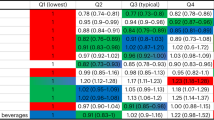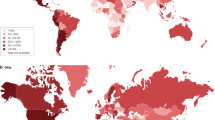Abstract
OBJECTIVE: To investigate whether body mass index (BMI) is related to energy intake during pregnancy, and whether BMI, energy intake and other factors are related to net weight gain. DESIGN: Longitudinal, duration of pregnancy. SUBJECTS: 156 healthy pregnant women residing in Quedlinburg county, Germany. METHODS: Weighed 7 d food records and standardized anthropometric measures in the first, second and third trimester. The analysis of variance (ANOVA) statistical technique was used to analyze differences in energy intake, net weight gain and birthweight across BMI groups, and the Cochran-Mantel Haenszel test was used to analyze food group intake by BMI group. RESULTS: Women at the highest level of BMI were significantly less often in the high energy intake category than women at the medium or low level of BMI (15% vs 36% and 48%). Net weight gain during pregnancy was independently influenced by BMI status and energy intake. Women at the highest level of BMI gained significantly less weight (4.2 kg) from first to third trimester than women at the medium or low levels of BMI (weight gains of 6.2 kg and 5.9 kg, respectively). Women with a low daily energy intake gained 4.6 kg during pregnancy, while women with medium and high energy intakes gained 6.0 kg and 6.1 kg, respectively. Examination of net weight gain simultaneously across BMI and parity groups revealed a much lower net weight gain among multigravid women at the highest BMI level (3.3 kg). Primigravid high BMI women, in contrast, gained 6.9 kg, whereas multigravid and primigravid women at medium and low BMI levels gained average of 4.8 kg and 6.5 kg, respectively. The mean birth weight in the three BMI groups did not differ and was not influenced by age, marital status, education, parity or smoking. CONCLUSION: Because other studies have shown that weight gain during pregnancy increases the risk of subsequent overweight, multigravid high BMI women may prevent an increased weight retention after pregnancy due to lower weight gain in the current gestation. A lower caloric diet may help to accomplish a lower weight gain during pregnancy in overweight women without increased risk of low birth weight infants. These findings indicate further investigation of the associations between BMI, parity and caloric intake during pregnancy are needed to increase understanding of factors affecting subsequent weight gain.
This is a preview of subscription content, access via your institution
Access options
Subscribe to this journal
Receive 12 print issues and online access
$259.00 per year
only $21.58 per issue
Buy this article
- Purchase on Springer Link
- Instant access to full article PDF
Prices may be subject to local taxes which are calculated during checkout
Similar content being viewed by others
Author information
Authors and Affiliations
Rights and permissions
About this article
Cite this article
Bergmann, M., Flagg, E., Miracle-McMahill, H. et al. Energy intake and net weight gain in pregnant women according to body mass index (BMI) status. Int J Obes 21, 1010–1017 (1997). https://doi.org/10.1038/sj.ijo.0800509
Received:
Revised:
Accepted:
Issue Date:
DOI: https://doi.org/10.1038/sj.ijo.0800509
Keywords
This article is cited by
-
Influence of gestational weight gain on low birth weight in short-statured South Indian pregnant women
European Journal of Clinical Nutrition (2018)
-
Early influences on cardiovascular and renal development
European Journal of Epidemiology (2010)
-
Maternal diet in early and late pregnancy in relation to weight gain
International Journal of Obesity (2006)
-
Diet during pregnancy in relation to maternal weight gain and birth size
European Journal of Clinical Nutrition (2004)



